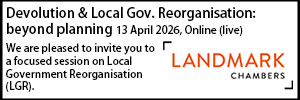Remote meetings: planning for permanence
- Details
Ed Hammond looks at the benefits of remote meetings and the likelihood the arrangements facilitating them will be put on a permanent footing.
We have spoken extensively to scrutiny and democratic services practitioners in recent months about how action to make the Regulations on remote meetings permanent would help to ensure that governance could be supported in a way that is more dynamic and flexible in future.
Once the pandemic is over, being able to convene formal meetings online is still likely to confer significant benefits. For colleagues in areas where the population is geographically dispersed with poor transport connections, or for joint committees, there will be particular value.
We still anticipate that physical meetings will become the de facto position for most councils – but having remote tools at our disposal will help us to do business more effectively.
Which is why it has been disappointing to see Government equivocating on putting these arrangements on a permanent footing. With other partners we wrote to the Minister, Luke Hall, earlier in the autumn to seek assurances on this point. He has since replied, saying,
“To extend the facility for councils to continue to meet remotely, or in hybrid form, would require primary legislation. There is no option to extend the current regulations under the Coronavirus Act 2020 as section 78 (3) contains the sunset date of 7 May 2021. There is considerable pressure on the Government’s legislative programme. However, I appreciate the arguments you have put forward and I will consider the case for this with colleagues in the Government”
It is true that the powers as they currently stand have been provided further to the Coronavirus Act and that the solution is not as simple as extending them, or removing the sunset provision on their operation. But this response does not seem to be especially creative, or to engage closely with the legislation in question. Governance professionals will be familiar with Schedule 12 of the Local Government Act 1972, which sets out arrangements for the convening of formal meetings. Section 4(1) of that Schedule states that,
“Meetings of a principal council shall be held at such place, either within or without their area, as they may direct.”
We think that a way to avoid the need for new primary legislation would be for the Secretary of State to lay an Order (using the general Order-making powers under the 1972 Act) which specifies that “place” can include the internet, or a videoconferencing platform, and that this Order would transpose the content of the current Regulations placing them under the 1972 Act rather than the Coronavirus Act.
Action to lay new secondary legislation also uses up Parliamentary time, but to a significantly lesser extent than a new Act, for example.
We are working closely with ADSO and LLG to investigate further whether this would be a credible solution. In the meantime we are all asking local councils to make contact with local MPs, and to contact the Minister direct, to highlight the importance, in the interests of good governance, that these powers are put on a permanent footing. ADSO and LLG members will have received further communication on this subject in recent days. We hope that we will be in a position to make contact with MHCLG to put a coherent proposition to them as to how we can achieve these objectives.
Ed Hammond is Director of Research and Campaigns at the Centre for Governance and Scrutiny.
Head of Legal Services / Deputy Monitoring Officer
Governance Officer/Company Secretary
Locums
Poll

















